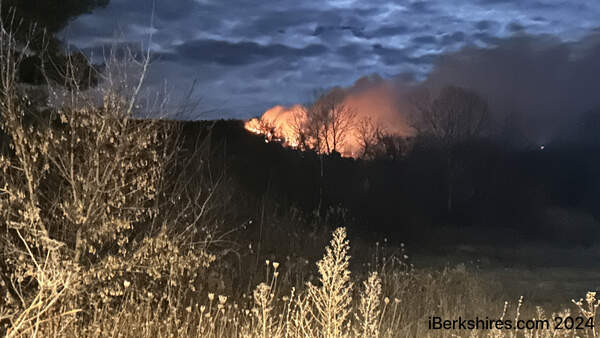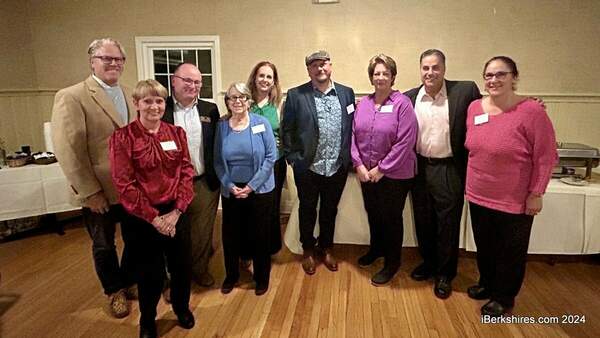Rep. Farley-Bouvier Sponsors 'Pay As You Drive' Bill
|
State Rep. Tricia Farley-Bouvier receives a 'valentine' with 218 signatures from MCLA students for her efforts on transportation at Monday's forum. |
PITTSFIELD, Mass. — State Rep. Tricia Farley-Bouvier has sponsored legislation that would replace the gas tax with a tax on mileage driven.
The bill (H3142) would first establish a pilot program of at least 1,000 volunteers from across the state driving an array of vehicles equipped with transponders to measure the number of miles traveled. The goal is to eventually create a program that will measure times of day, areas and mileage, and implement a tax structure with varied prices for the types of usage.
"The idea is that it would be an alternative to the gas tax. People think of the gas tax as a user fee and this vehicle-miles traveled program would be a smarter user fee," Farley-Bouvier said on Monday at a transportation forum at Berkshire Community College. "The key to this is to raise revenue in a fair way ... the gas tax is something we can't continue to rely on."
The 3rd District representative has been advocating more equity in transportation spending and revenues, frequently pointing out that the Massachusetts Bay Transit Authority's budget leaves little money available for public transportation in more rural regions.
That would factor into the proposed mileage tax. Farley-Bouvier said the Berkshires would have a lower rate because the county does not have access to public transportation.
For instance, a person who drives in Boston during rush hour when he or she could have been taking public transit would be taxed much more than a driver in the Berkshires. From times of day to type of vehicle to location to fuel efficiency and car-pool participation, the program would create a menu of different rates.
For example, those who drive at night, putting less strain on the road, would have a lower rate while large commercial trucks would have to pay more because of the wear and tear they cause to highways.
According to Elizabeth "Lizzie" Weyant, advocacy director for Transportation for Massachusetts, all of the dollars generated would go explicitly for transportation improvements.
"The gas tax is diminishing," Weyant said. "This idea would be a supplement to the gas tax revenue."
The state has been getting less and less revenue from the gas tax, which has not been raised since 1991, as fuel-efficient cars become more prevalent. The "pay as you drive" program would help create a predictable, reoccurring revenue stream for transportation. Weyant said pilot programs have been implemented in other states but this one would be the largest.
Several former U.S. transportation secretaries have endorsed the idea and the concept is gaining ground in Europe. A recent report from the U.S. Government Accountability Office said "such fees can lead to more equitable and efficient use of roadways," but that implementing the program on the nation's 230 million vehicles "is likely to greatly exceed the costs of collecting fuel taxes." However, the report recommends further research on the issue, particularly for trucking.
VMT proposals have sparked concerns over privacy — a global positioning device would be used to track mileage — and over putting less focus on fuel efficiency.
Farley-Bouvier said the bill is difficult to explain because the pilot program is designed to analyze multiple unanswered questions.
It's not known how the tax would collected — whether at the gas pump or during the yearly inspection — nor what the fee structure would be. Additionally, attaching the transponders to vehicles is another unanswered question.
"We need to find out what we collect and how equitable it can be," Farley-Bouvier said, calling the idea "progressive and forward thinking."
The "No. 1 concern" Farley-Bouvier has heard is residents are "afraid of big brother." But she defends that by saying if the pilot program moved forward to law, there would be language limiting how the transponders could be used.
"Everyone already has this kind of information in their cell phone," she said. "But we'll have to place provisions in the law that will limit what they can be used for."
The bill establishing the pilot program had just been introduced, sponsored by Farley-Bouvier and Medford Rep. Carl Sciortino, and has been referred to the Joint Committee on Transportation.
For more on the VMT, Streetsblog.org has an article on the GAO report and state efforts.
Tags: legislation, taxes, transportation,


.jpg)














